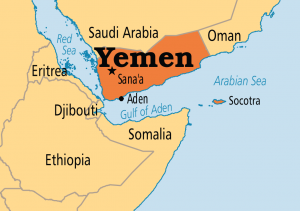Located in the Indian Ocean about 340 km southeast of Yemen, the Socotra Island archipelago holds a very strategic location between Somalia and Yemen, being the largest of several islands extending east-ward from the Horn of Africa, while overlooking the critical route of trade moving into Bab el Mandab Strait.
 Socotra is in fact an island like no other. Having been described as the “Jewel of the Gulf of Aden”, one look at a picture of its natural habitat is what it takes to recognize it being straight out of fantasy novels. Historically speaking, Greek and Arab sailors passing through the island linked this land with paradise because of its beauty. It is home for a wide range of zoological and botanical treasures, and a shelter for relic species the no longer exists elsewhere. In recognition of its distinct plant and animal life, the archipelago was designated a UNESCO World Heritage site in 2008. Its majestic nature managed to bring about legendary folktales one of which is the famous story that surrounds the Dragon Blood Tree, a symbol of the island. The tree has exceptional characteristics; looking like an umbrella and bleeding when it is truncated and is also known as the “Brothers Blood Tree”. It has been narrated in a Yemeni legend to be linked to the story of the first murder on Earth, the story of Cain and Abel. It is said that Cain and Abel were the first to live on the Socotra Island, and the blood when Cain killed his brother, Abel was the reason the Dragon blood tree grew.
Socotra is in fact an island like no other. Having been described as the “Jewel of the Gulf of Aden”, one look at a picture of its natural habitat is what it takes to recognize it being straight out of fantasy novels. Historically speaking, Greek and Arab sailors passing through the island linked this land with paradise because of its beauty. It is home for a wide range of zoological and botanical treasures, and a shelter for relic species the no longer exists elsewhere. In recognition of its distinct plant and animal life, the archipelago was designated a UNESCO World Heritage site in 2008. Its majestic nature managed to bring about legendary folktales one of which is the famous story that surrounds the Dragon Blood Tree, a symbol of the island. The tree has exceptional characteristics; looking like an umbrella and bleeding when it is truncated and is also known as the “Brothers Blood Tree”. It has been narrated in a Yemeni legend to be linked to the story of the first murder on Earth, the story of Cain and Abel. It is said that Cain and Abel were the first to live on the Socotra Island, and the blood when Cain killed his brother, Abel was the reason the Dragon blood tree grew.
Despite its strong characteristics as a tourist destination, the island is caught in geopolitical crossfire in a Yemen torn by war and one of the worst humanitarian crises in the world. Over the past couple of days, News on Israeli tourists visiting Socotra surfaced over the internet, particularly on different Turkey-traced, sometimes Qatari, owned media, raising controversy on Yemen sovereignty especially as the visits are tied to the ‘Abraham Accords’ between Israel and the UAE, given that Abu Dhabi is in control of the island of Socotra since 2018.
 The control of UAE over Socotra came about as a result of a coalition between Saudi and UAE intervening in Yemen in March 2015, as Yemen slipped into civil war following the oust of the Saudi-backed government by Iran-aligned Houthis. The UAE significantly increased its presence on the island in since 2015 as it offered relief aid through the Emirates Red Crescent and the Khalifa Foundation. Through a combination of hard and soft power UAE presence remained high gaining both popularity and opposition among local residents. On 30 April 2018, the United Arab Emirates deployed troops with artillery and armored vehicles on the island. However, in July 2019, the United Arab Emirates (UAE) announced a withdrawal of its forces from Yemen, yet the territorial gains seem to remain under its control in the island. This is evident as in 2020, The Southern Transitional Council (STC), previously backed by the UAE, seized control of Yemen’s island deposing its governor and driving out forces of the Saudi-backed government. It is also agreed upon among experts that UAE has significant control the STC to that it has been often labeled an Emirati “proxy” which has been clear as STC’s leadership announced praising the Abraham Accords shortly after its announcement.
The control of UAE over Socotra came about as a result of a coalition between Saudi and UAE intervening in Yemen in March 2015, as Yemen slipped into civil war following the oust of the Saudi-backed government by Iran-aligned Houthis. The UAE significantly increased its presence on the island in since 2015 as it offered relief aid through the Emirates Red Crescent and the Khalifa Foundation. Through a combination of hard and soft power UAE presence remained high gaining both popularity and opposition among local residents. On 30 April 2018, the United Arab Emirates deployed troops with artillery and armored vehicles on the island. However, in July 2019, the United Arab Emirates (UAE) announced a withdrawal of its forces from Yemen, yet the territorial gains seem to remain under its control in the island. This is evident as in 2020, The Southern Transitional Council (STC), previously backed by the UAE, seized control of Yemen’s island deposing its governor and driving out forces of the Saudi-backed government. It is also agreed upon among experts that UAE has significant control the STC to that it has been often labeled an Emirati “proxy” which has been clear as STC’s leadership announced praising the Abraham Accords shortly after its announcement.
Interest in Socotra appeared to have been a complex a matter of dispute between the Saudi and UAE allies. The implicit battle for Socotra between the two allies could be seen as an indication that they are not always in agreement. While they are strong allies against the Houthis, they are clear competitors for Yemen’s present and future regional balances. UAE interests are embodied in controlling Socotra to strengthen its commercial and military projection in the Indian Ocean, while for Saudi Arabia, stopping UAE ambitions reaffirms leading in the balance of powers in the Gulf region.
Whether the news on Israeli tourists is true or a rumor propagated from competitive regional powers to spark opposition movements on the island remains a matter of question. Nonetheless, the more important question that remains to be asked is: Will the international community take action in the direction of a peaceful sovereign Yemen?

